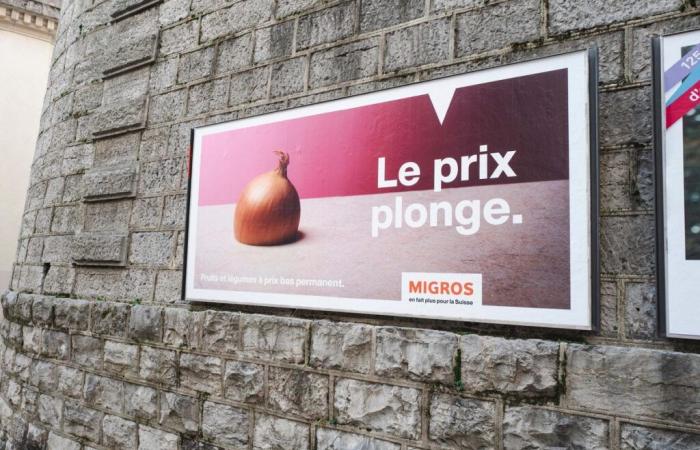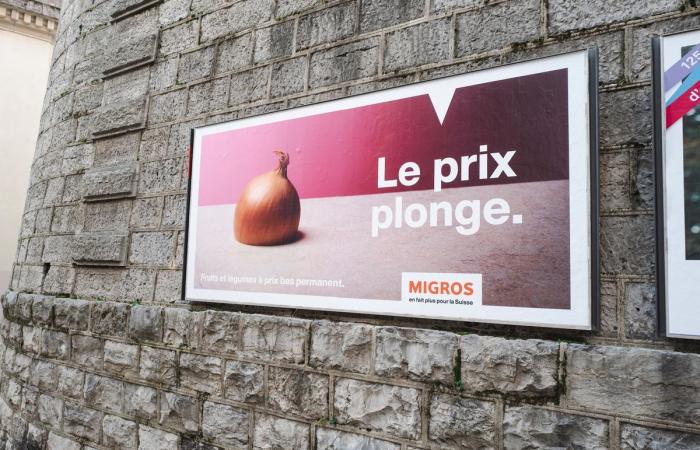Commercial strategy –
Producers fear paying for Migros’ “low prices”
The major retailer has announced its strategy to compete with discounters. He assumes responsibility for the consequences alone.
Published today at 8:55 a.m.
“The price is plummeting,” assures Migros. Despite the promises of the major distributor, producers fear that their margins will too.
MARIE-LOU DUMAUTHIOZ
Subscribe now and enjoy the audio playback feature.
BotTalk
- Migros reduces the prices of 1,000 products to compete with discounters.
- The major distributor assures that it alone assumes an investment of 500 million.
- Agricultural producers fear effects despite promises.
- The Market Gardening Technical Office reminds that the price is not always representative of the value of the product
Apples, potatoes and other cucumbers are the flagships of the new commercial strategy launched by Migros on Monday. To counter competition from discounters, the Swiss distribution giant has announced that it wants to lower the prices of more than 1,000 essential products to their level.
On the shelves and on the online shopping site, around fifty fruits and vegetables have been offered for a week at a preferential rate. And the cooperative affirms that it is it and it alone that will assume the consequences.
Migros is investing 500 million francs in this operation over the next five years. And will assume the consequences in terms of its profits: “Investments are not made to the detriment of farms and producers,” assures Mario Irminger, president of the Federation of Migros cooperatives.
Producers who are not very talkative
In other words, the purchase price “offered” to market gardeners, farmers and other arborists would not be affected. When questioned, the main people concerned were not very talkative, when it was not simply their silence which showed their reluctance to take a position on the issue.
This is because the theme is sensitive for producers who need the contract signed with major distributors, Migros in the lead, to survive. This is what one of them explains, on condition of anonymity: “Migros accounts for more than 50% of my turnover. So I don’t really want a slightly nuanced opinion on the attitude of major distributors to expose me to future collaborations, let’s say… less fruitful.”
In any case, if it is clear that the consumer will come out a winner from this operation, the producer should not come out a loser. Without, however, the pressure put on them diminishing.
After reading the press release released at the beginning of the week by Migros, the people of the land, who are fighting to obtain a fair wage for their work, may find it a little brackish. “Of course, Migros is doing its part by seeking to favor its customers. But why would what it can visibly cut into its margins not also benefit – at least in part – its producers, for whom it could increase the purchase price of the products,” notes Julie Ristord, director of the Technical Office market garden in Morges, which brings together more than 300 producers from Vaud and Geneva.
For the latter, it is obvious that there is concern on the part of the agricultural world regarding this action and the declarations which accompany it. “The question of the cost of fruits and vegetables is recurrent and resurfaces each time actions of this type are implemented. Because the price is not always representative of the value of the product.”
We tend to forget the risks taken by fruit and vegetable growers whose work has nothing to do with a flawless industrial process. “These are living products, with all the hazards that this entails, and which cannot be controlled…”
The exercise which has just ended provides a perfect example. The weather conditions were such that some market gardeners were not even able to enter their carrot fields to harvest them. And therefore sell them. “Yet they invested by purchasing seeds, inputs and hiring labor. And these costs are obviously the only ones to bear them.”
Sleight of hand?
In any case, some fear a little sleight of hand on the part of Migros to somewhat cushion the effects of its new commercial strategy. “We will have to see what range of products these reductions relate to,” notes a market gardener.
Migros could, for example, purchase more M-Budget products on which the producer margin is thinner. A quick analysis of the 54 low prices displayed this week could reassure him. Of the thirteen Swiss products that are part of the panel, there is one M-Budget packaging (out of ten in total) for apples and one organic label (out of three) for carrots.
Certainly, but it remains to be seen from whom these fruits and vegetables are purchased. “If someone sells around twenty different products to Migros, they can easily tolerate two or three of them suddenly being taken at the M-Budget price. But if this price concerns the only vegetable for which you have a contract with Migros, the business risks no longer being profitable at all,” continues the vegetable producer.
“Latest news”
Want to stay on top of the news? “24 Heures” offers you two appointments per day, directly in your email box. So you don’t miss anything that’s happening in your Canton, in Switzerland or around the world.
Other newsletters
Log in
Did you find an error? Please report it to us.
8 comments







